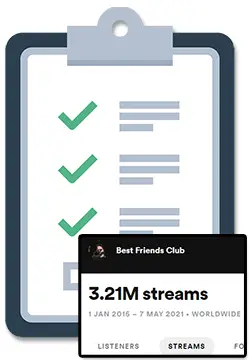Comparing TuneCore with DistroKid is a much different beast in 2023 now that Tunecore has new pricing and plans available that are much more competitive with DistroKid.
Before these drastic changes, DistroKid was the clear winner since they were the music distributor that offered unlimited uploads for a small annual fee as opposed to an expensive “pay-per-release” pricing model.
However, things are MUCH different in 2023 now that TuneCore offers unlimited song uploads for an annual fee that is actually less than what DistroKid charges.
On top of this: a lot of the things that DistroKid charges you extra upon release that they call “Goodies” (aka DistroKid’s hidden fees) are built into TuneCore’s smaller annual fee.
So does this mean that it is now a no-brainer to go with TuneCore and if you are already using DistroKid does it make sense to switch over?
Maybe. Either way, this is true:
Both DistroKid and TuneCore are amazing music distributors because they both offer unlimited music uploads and the ability to set a release date for a low annual fee.
Let’s take a closer look at comparing these 2 to find out what is best for you as an artist or label.
Is TuneCore Better Than DistroKid In 2023?
Ultimately the answer to this question depends on what you’re needs are as an artist since the differences between these 2 music distributors are not as great as they once were.
Both DistroKid and Tunecore allow you to release unlimited music to streaming services while keeping 100% of your royalties. However, Tunecore is better because their annual fee is cheaper and gives you more features for that price (DistroKid charges for these as paid add-ons called “Album Extras”).
So, let’s take a look at the pros and cons of using each before diving into some specific scenarios like which to choose if you are looking for the cheapest or if you heavily rely on splitting royalties.
Pros & Cons Of Using TuneCore In 2023
The main pros of using TuneCore in 2023 are that they are cheaper and offer better customer support.
The main cons of using TuneCore in 2023 are that they do not yet offer revenue splits and that this new pricing model is new and relatively untested.
| Pros | Cons |
|---|---|
| Cheaper annual fee than DistroKid | There may be growing pains with their new pricing model |
| Less upsells or hidden fees | Artist revenue splits aren’t available but are coming soon |
| Better customer support | No integration with Tracklib |
| “Rewards” system to get access to education and opportunities |
Pros & Cons Of Using DistroKid In 2023
The main pros of using DistroKid in 2023 are that they are still very affordable (especially if you skip the “goodies) and that they currently offer royalty splits.
The main cons of using DistroKid in 2023 are that they are more expensive (especially if you purchase their “goodies”) and that their customer support can be hit or miss.
| Pros | Cons |
|---|---|
| Still very affordable annual fee | More expensive annual fee than TuneCore |
| Revenue splits are available now and really easy to use | Lots of hidden fees and upsells when you are releasing music |
| Integration with Tracklib | Customer support is very hit or miss |
If you’re looking for the cheapest price:
The TuneCore plan I would recommend is the Rising Artist plan costs $14.99 per year while the DistroKid plan I would recommend is the Musician Plus plan which costs $35.99 per year.
If you ignore all of DistroKid’s “Goodies” (which is what I do and is what I highly recommend you do) then the difference is only $20 a year which isn’t much.
However, if you like to add on DistroKid’s “Goodies” then DistroKid suddenly becomes dramatically more expensive.
Either way: if you are looking for the cheapest price to release music then TuneCore is better than DistroKid.
If you need to contact Customer Support a lot:
I’m not going to lie… I personally use DistroKid to release my music and have not had to contact their customer support too often.
However, although I’ve definitely had good experiences, for the most part, the strategy of their customer support is very much to quickly send you to a FAQ article instead of being of service.
With that said if you plan to hit up support a lot, I’ve only heard good things about TuneCore’s customer support.
So, I think it is safe to say…
If you need to contact customer support often then TuneCore is better than DistroKId.
If you need to split your royalties:
Whether it is if your release is a collab, you worked with a label, or are using something like Tracklib: being able to split your royalties is very, very useful.
Although this feature is coming soon to TuneCore, DistroKid has this feature enabled right now, and, having used it before, I can tell you it is very intuitive and a treat to use.
If you need to split your royalties, DistroKid is better than TuneCore.
Should A New Artist Go With TuneCore Or DistroKid?
Although I currently use DistroKid, enjoy using DistroKid, and would recommend DistroKid to any artist…
I think it’s important for me to provide the best possible advice for any artist that wants my advice.
This is why in spite of DistroKid being my personal distributor of choice, I believe that:
New artists should choose TuneCore as their music distributor because they are more affordable, have no hidden fees, and have quality customer support.
With that said, the differences between TuneCore and DistroKid are really not that great and I genuinely think you’ll be happy releasing music with either. 🙂
Should You Switch From DistroKid To TuneCore?
There’s is no denying that TuneCore’s updated offering is really appealing and can make any DistroKid user question their loyalty and start wondering if the grass is greener on the other side.
I can’t lie: I’m definitely eyeing TuneCore and may consider testing a release or 2 with them in the future.
With that said…
DistroKid users shouldn’t switch to TuneCore if they are currently happy releasing music with DistroKid.
If you ignore DistroKid’s “goodies” and don’t need to reach out to customer support often, the hassle you’d have to go through to move your catalog and get used to a new distributor isn’t worth saving a few bucks.
You should honestly focus on releasing more music instead.
However: if you’re unhappy with DistroKid or tend to spend an arm and a leg by adding on “Goodies” each time you submit a song, it could be worth taking a look at TuneCore.




